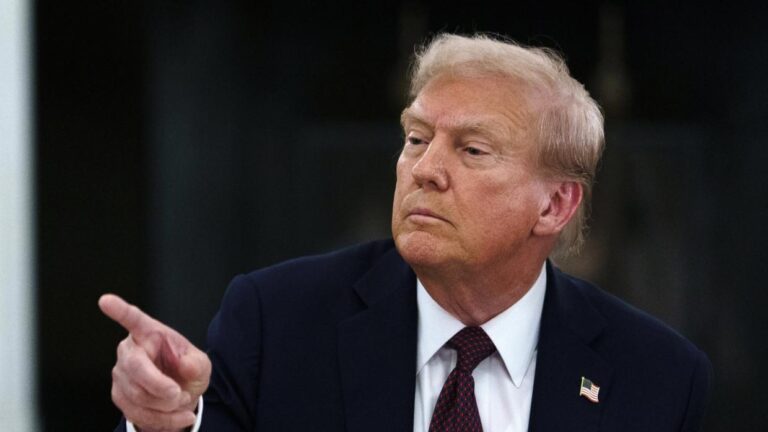In recent months, tensions between the United States and India have shown signs of strain, prompting concerns among policymakers and analysts alike. As one of the world’s largest democracies and a crucial strategic partner in the Indo-Pacific region, India’s relationship with the U.S. plays a pivotal role in global geopolitics. However, actions and remarks from former President Donald Trump have raised questions about the future trajectory of this partnership. This article explores the implications of Mr. Trump’s approach toward India and argues why a recalibration is essential to preserve and strengthen the decades-long alliance between the two nations.
The Impact of Strained US-India Relations on Global Strategic Interests
The recent tensions between the United States and India risk undermining pivotal geopolitical alliances that have long served as a counterbalance to China’s expanding influence in Asia. Washington’s increasingly transactional approach has triggered concerns in New Delhi about the reliability of the partnership. Such strains could lead India to reevaluate its strategic autonomy, potentially deepening engagements with alternative powers that promise more consistent cooperation. This shift not only affects bilateral ties but also weakens collective efforts on global issues such as climate change, terrorism, and economic stability.
The consequences ripple far beyond South Asia. Key global interests hinge on a robust US-India alliance, including:
- Maritime security in the Indo-Pacific-ensuring freedom of navigation and countering regional aggressors
- Technological collaboration-joint innovations in defense, space, and energy sectors
- Democratic values promotion-strengthening governance models amidst rising authoritarianism
As these areas face vulnerabilities, the broader strategic equilibrium becomes precarious, signaling an urgent need for diplomatic recalibration from both sides.
| Global Strategic Interest | Potential Impact of Strained US-India Relations |
|---|---|
| Indo-Pacific Stability | Reduced joint maritime operations, increased regional tensions |
| Counterterrorism | Decreased intelligence sharing, fragmented threat response |
| Technology & Defense Collaboration | Slowed innovation, potential arms race intensification |
Analyzing the Consequences of Rhetoric and Policy Missteps on Bilateral Ties
The recent miscalculations in diplomatic rhetoric and policy direction have introduced tangible strains between the United States and India, two historically strategic partners. Ill-timed remarks and inconsistent trade policies have not only caused discomfort but have also jeopardized years of relationship-building, potentially pushing New Delhi to seek alternative alliances. Experts warn that such missteps risk undermining progress on critical fronts, including defense cooperation, technology sharing, and regional security efforts.
What’s at stake is not just bilateral goodwill, but also the broader geopolitical balance in Asia. The repercussions can be summarized as:
- Trade Disruptions: Increased tariffs and unclear investment guidelines are discouraging American companies from committing long-term capital in India.
- Defense Collaboration: Ambiguity about the U.S. stance on India’s regional security priorities is slowing joint military initiatives.
- Strategic Divides: Divergent approaches to issues like climate change and multilateral institutions are fostering diplomatic rifts.
| Policy Area | Impact | Potential Consequence |
|---|---|---|
| Trade Agreements | Stalled negotiations | Reduced market access |
| Defense Partnerships | Halted joint exercises | Weakened security ties |
| Policy Area | Impact | Potential Consequence |
| Trade Agreements | Stalled negotiations | Reduced market access |
| Defense Partnerships | Halted joint exercises | Weakened security ties |
| Technology Sharing | Delayed approvals | Slowed innovation collaboration |
| Climate Policy Coordination | Conflicting commitments | Diplomatic friction |
If you need help analyzing or summarizing this further, feel free to ask!
Building Bridges Through Diplomacy and Economic Partnership to Secure a Stronger Future
Diplomatic engagement remains indispensable for fostering a resilient partnership between the United States and India, especially in an era defined by rapid geopolitical shifts. India’s strategic location and demographic prowess position it as a vital player in balancing regional influences and advancing global stability. However, recent rhetoric and policies risk alienating an essential ally, potentially undermining decades of painstakingly cultivated goodwill and cooperation. Constructive dialogue and mutual respect should be prioritized to build trust and chart a course toward shared objectives.
Economic collaboration stands as a cornerstone in cementing bilateral relations, with vast potential for growth and innovation. Both nations benefit from expanding trade ties, technology exchanges, and joint infrastructure projects, which foster job creation and sustainable development. Key areas for unlocking this potential include:
- Renewable energy initiatives to combat climate change and reduce dependency on fossil fuels.
- Defense partnerships that enhance security and technological advancement.
- Digital economy cooperation encouraging innovation in artificial intelligence and 5G deployment.
| Sector | Potential Impact | Current Status | ||
|---|---|---|---|---|
| Renewable Energy | High – Shared clean tech development | Emerging collaboration | ||
| Defense | Critical – Regional security enhancement | Defense | Critical – Regional security enhancement | Strengthening alliances and joint exercises |
| Digital Economy | Significant – Technological innovation and market growth | Expanding partnerships and pilot programs |
To realize these opportunities fully, both countries must commit to sustained engagement, transparent communication, and equitable frameworks that respect each nation’s interests and values. This collaborative spirit will not only nurture economic and strategic gains but also strengthen the foundation for a long-term, dynamic partnership capable of addressing complex challenges on the global stage.
If you need assistance with anything else like styling, restructuring, or content enhancement, feel free to ask!
Wrapping Up
As tensions between the United States and India continue to simmer, it remains imperative for policymakers in Washington to recognize the strategic and economic significance of the Indo-American partnership. Pursuing policies that alienate one of the world’s largest democracies risks undermining years of progress and shared interests. Moving forward, a recalibrated approach grounded in mutual respect and collaboration will be essential to safeguarding the future of this pivotal alliance. Without such efforts, the consequences could extend far beyond bilateral relations, impacting global stability and prosperity.



